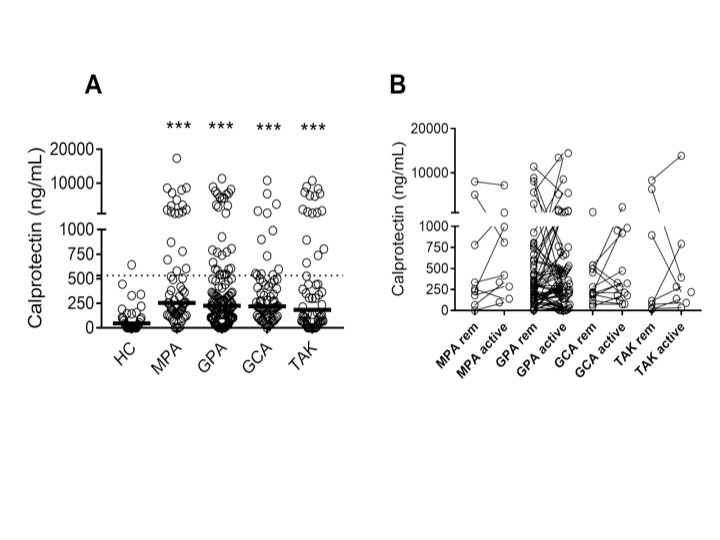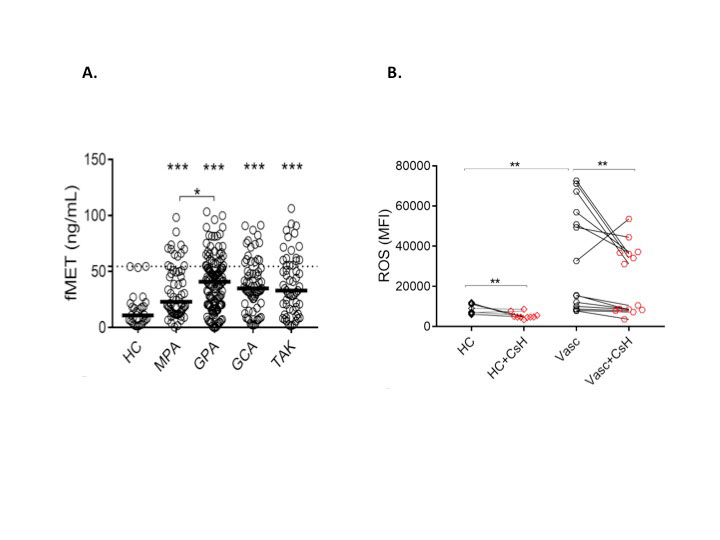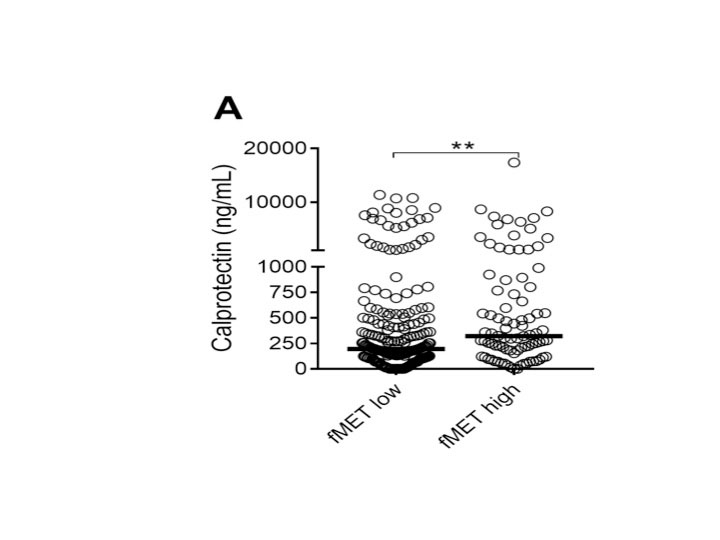Session Information
Date: Saturday, November 12, 2022
Title: Vasculitis – Non-ANCA-Associated and Related Disorders Poster I: Giant Cell Arteritis
Session Type: Poster Session A
Session Time: 1:00PM-3:00PM
Background/Purpose: Neutrophils contribute to the pathogenesis of many autoimmune diseases. The purpose of the study was to assess two markers of neutrophil activation, calprotectin and N-formyl methionine (fMET), in anti-neutrophil cytoplasmic autoantibody-associated vasculitis (AAV) and large-vessel vasculitis (LVV). As fMET induces via its highly expressed G-protein coupled receptor, formyl peptide receptor 1 (FPR1) neutrophil chemotaxis, degranulation, and reactive oxygen species (ROS) generation, we sought to determine whether fMET/FPR1-mediated signaling can drive neutrophil activation in patients with vascultis.
Methods: Levels of fMET and calprotectin were measured by ELISA in the plasma of healthy controls (n=30) and patients with AAV (granulomatosis with polyangiitis (GPA, n=123), microscopic polyangiitis (MPA, n=61)), and LVV (Takayasu’s arteritis (TAK, n=58), giant cell arteritis (GCA, n=68)), at times of remission or flare. Disease activity was assessed by physician global assessment. In vitro neutrophil activation assays, analyzing ROS induction using flow cytometry were performed in the presence or absence of FPR1 inhibitor cyclosporine H.
Results: Levels of calprotectin and fMET were elevated in patients with vasculitis as compared to healthy individuals (Figures 1A and 2A). Levels of fMET correlated with markers of systemic inflammation: C-reactive protein (r=0.82, p< 0.0001) and erythrocyte sedimentation rate (r=0.235, p< 0.0001). Calprotectin was not associated with disease activity (Figure 1B). Circulating levels of fMET were associated with neutrophil activation (p< 0.01) (Figure 3) and were able to induce de novo neutrophil activation via FPR1-mediated signaling that was abrogated by the selective FPR1 antagonist cyclosporine H (Figure 2B).
Conclusion:
Circulating fMET appears to propagate neutrophil activation in AAV and LVV. Inhibition of fMET-mediated FPR1 signaling could be a novel therapeutic intervention for systemic vasculitides.
To cite this abstract in AMA style:
Michailidou D, Duvvuri B, Kuley R, Cuthbertson D, Grayson P, Khalidi N, Koening C, Langford C, McAlear C, Moreland L, Pagnoux C, Seo P, Specks U, Sreih A, Warrington K, Mustelin T, Monach P, Merkel P, Lood C. Markers of Neutrophil Activation in Patients with ANCA-associated Vasculitis and Large-vessel Vasculitis [abstract]. Arthritis Rheumatol. 2022; 74 (suppl 9). https://acrabstracts.org/abstract/markers-of-neutrophil-activation-in-patients-with-anca-associated-vasculitis-and-large-vessel-vasculitis/. Accessed .« Back to ACR Convergence 2022
ACR Meeting Abstracts - https://acrabstracts.org/abstract/markers-of-neutrophil-activation-in-patients-with-anca-associated-vasculitis-and-large-vessel-vasculitis/



